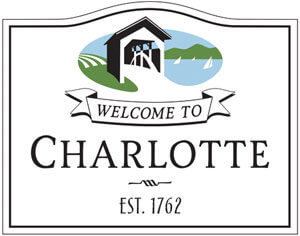Proposed East Charlotte village commercial boundaries nearly complete

The bulk of Thursday’s Planning Commission meeting was again devoted to discussion among members and the public regarding Act 143 as it applies to the Charlotte Land Use Regulations. The commission heard from several interested individuals, including Philo Ridge Farm, but took no action.
Planning Commission Chair Peter Joslin opened discussion by reviewing the areas previous meetings touched on, including the challenge in interpreting and clarifying the section in the act where “more than 50 percent of the total annual sales are from qualifying products that are principally produced on the farm.” He mentioned the work done to date by Town Planner Daryl Arminius on creating a database of Charlotte farms based on state agricultural data and whether to consider a site plan review for accessory on-farm businesses. Joslin explained it could be similar to what currently exists for home occupation III in the LUR.
Mike Yantachka, whom Joslin had asked to attend the meeting, read passages from the bill and said, “The whole purpose of Act 143 is to make it easier for farms to have other sources of income as long as they are farm-related.” He said that while he was not involved in the development of Act 143 he would be willing to go “back to the Legislature in January to see what can be done to clarify the idea of what it means to be ‘principally produced’ on the farm.”
Planning Commission members raised questions about the meaning of “principally produced on the farm.” Joslin referenced the previous zoning administrator’s research on potential accessory on-farm businesses and “his take on it seemed very broad.” He continued, “I find myself going back to the 51 percent number…that in and of itself is no easy task.” James Faulkner said, “When (the accessory on-farm business) income exceeds the income from farming, it’s no longer considered an accessory on-farm business.” Vice Chair Charlie Pughe replied, “You’d never get to that threshold because everything is an on-farm product.”
Several members of Philo Ridge Farm spoke in favor of less regulation. Diane McCargo said, “As we understand it, this was an effort to help farms. Farms are struggling in Vermont. It’s hard to make a profit. …Regulate them less so people can take a risk and do something.”
Tad Cooke spoke about all the permits Philo Ridge Farm has had to obtain in the last nine months and suggested creating “an approach that other towns can look to,” including a voluntary application process. “There are numerous ways for the town to be involved in the development of any business as a supporter and as a regulator. I would say Act 143 shouldn’t be that tool,” said Cooke. Meriwether Hardie supported Cooke’s suggestion, requesting “a period of information gathering before we put more restriction in place.” She said, “Take a longer view of what this act could be in terms of promoting and supporting what farming can be.”
The commission closed discussion on the topic and said it would be on the agenda again at the next meeting on Nov. 21.
Homestays and short-term rental units
The commission discussed short-term rentals with interested resident Mike Wool, who had raised the topic at a previous Selectboard meeting and was referred to the Planning Commission. He spoke about a short-term rental property on Hills Point Road, citing concerns about safety, increased traffic and noise. Joslin said, “Folks rent their houses out on Thompson’s Point all the time. What’s the difference between that and another part of town?”
Planning Commission member Marty Illick asked if there was language in town regulations about short-term rentals and said that was the first step. After a bit more discussion on the topic, no action was taken.
East Charlotte Village boundaries
The East Charlotte Village commercial boundaries moved forward with Pughe circulating a map among commission members. The proposed boundary map included staff assistance from the Chittenden County Regional Planning Commission. “We tried to follow property lines,” Pughe said. “It includes the Grange but doesn’t pick up what the Catholic church owns. We had talked about that and didn’t incorporate that into the commercial space.”
Planning Commission members James Faulkner and David Kenyon asked questions on a few boundary lines, and members of the Charlotte Grange spoke in favor of village designation. Joslin closed the discussion by asking Pughe to make a few suggested changes to the map and said, “By next meeting we need to focus on what we want to propose.”
Other business
The commission heard from applicant during a sketch plan review of PC-19-179-SK Hutchins. Jason Hutchins is requesting the creation of a new lot and boundary adjustments of three lots along Riverview Drive. The commission approved it as a minor subdivision amendment and directed the town planner to verify the correct application type. The commission also approved a six month extension on PC-18-227-SK Snead-Couture to “resolve issues brought up in sketch plan review,” according to the applicant.
During public comment, Peter Carreiro of Rise n’ Shine asked for clarification on two sections of the Town Plan as it related to his property on the corner of Route 7 and Ferry Road and advisory design review guidelines. Kenyon offered the clarification, “[the proposed guidelines are] considerations, they’re not prescriptive.”
Last, the commission reviewed draft guidance from the zoning administrator outlining zoning permit questions. The guidance was suggested by Selectboard member Fritz Tegatz as a possible solution to address some of the questions received by town officials regarding zoning regulations.

